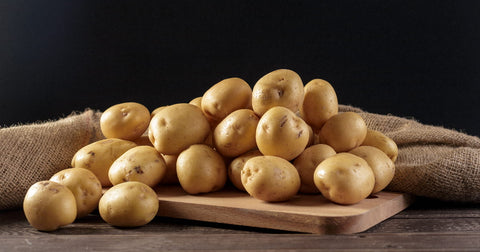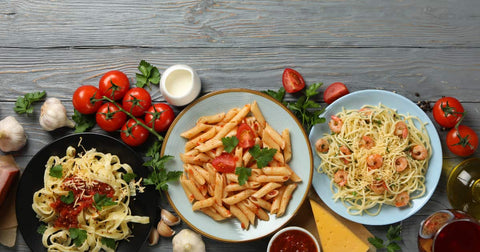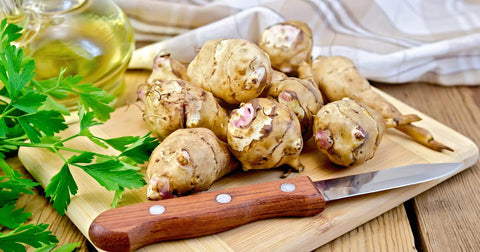Potatoes, a culinary staple enjoyed globally, often spark the question: "Is potato a vegetable?" While their common usage suggests so, the answer is a bit more nuanced. Let's dig into the world of potatoes and other underground wonders to understand their botanical classification and nutritional benefits.

Is Potato a Vegetable? A Botanical Perspective
Botanically, potatoes are classified as tubers, which are modified stems that grow underground. Therefore, while we often treat them as vegetables in cooking, they are technically a type of tuber.
Tuber Vegetables: Underground Treasures
Tuber vegetables are characterized by their edible underground stems, which store nutrients for the plant. Besides potatoes, other examples of tuber vegetables include:
-
Sweet potatoes
-
Yams
-
Jerusalem artichokes
-
Cassava
Root Vegetables List: Exploring the Differences
While often confused with tubers, root vegetables are different. They are edible taproots that grow underground. Examples of root vegetables list include:

-
Beets
-
Radishes
-
Turnips
-
Parsnips
The key difference lies in the anatomical structure: tubers are modified stems, while roots are modified roots.
Are Tuber Vegetables Good for You? Nutritional Benefits
Are tuber vegetables good for you? Absolutely! They offer a wealth of nutritional benefits:
-
Carbohydrates: Provide energy.
-
Fiber: Promotes digestive health.
-
Vitamins and Minerals: Rich in vitamins C, B6, potassium, and manganese.
-
Antioxidants: Offer protection against cell damage.
Benefits of Root Vegetables: Earthy Goodness
Similar to tubers, benefits of root vegetables are abundant:
-
Vitamins and Minerals: Excellent sources of vitamins A, C, and K, as well as folate and potassium.
-
Fiber: Supports digestive regularity.
-
Antioxidants: Offer protection against free radicals.
-
Phytonutrients: Provide various health-promoting compounds.
Benefits of Root Vegetables: A Deeper Dive
Root vegetables are known to:

-
Boost immune system function.
-
Support healthy vision.
-
Contribute to heart health.
-
Aid in detoxification.
Potatoes and Dietary Considerations
While potatoes offer nutritional benefits, it's important to consider preparation methods. Frying potatoes can significantly increase their calorie and fat content, while baking or boiling preserves their nutritional value.
Food Intolerance and Tuber Vegetables
Some individuals may experience digestive issues after consuming potatoes or other tuber vegetables. This could be due to a food intolerance or sensitivity.
Food Sensitivity Test Kit: Identify Your Triggers
If you suspect you have a food intolerance, a food sensitivity test kit can help identify specific triggers. By eliminating or limiting these foods, you can improve your digestive health and overall well-being.
Key Takeaways:

-
Potatoes are botanically classified as tubers, not root vegetables.
-
Both tuber and root vegetables offer significant nutritional benefits.
-
Preparation methods significantly impact the nutritional value of potatoes.
-
Food intolerances to tuber vegetables can occur.
Remember, this article is intended for informational purposes only and should not be considered a substitute for professional medical advice. If you have any concerns about your health or dietary choices, consult a qualified healthcare professional.
Frequently Asked Questions:
1. What's the main difference between a tuber and a root vegetable?
Tubers are modified stems that grow underground and store nutrients, like potatoes. Root vegetables are modified taproots, such as carrots or beets.
2. Are potatoes considered healthy?
Yes, potatoes offer nutritional benefits like carbohydrates, fiber, vitamins, and minerals. However, preparation methods significantly impact their nutritional value. Baking or boiling is healthier than frying.
3. Why do some people have digestive issues after eating potatoes?
Some individuals may have food intolerances or sensitivities to certain compounds in potatoes or other nightshade vegetables. A food sensitivity test can help identify triggers.
4. Are sweet potatoes and regular potatoes in the same food category?
Yes, both are tubers and are generally categorized as starchy vegetables. However, they have slightly different nutritional profiles.
5. How can I incorporate more tuber and root vegetables into my diet?
You can roast, bake, boil, or steam them. Add them to soups, stews, salads, or side dishes. Experiment with different varieties to find your favorites.


.png?v=1737390083)
.png?v=1737187409)


